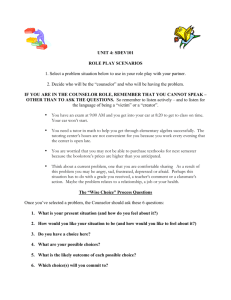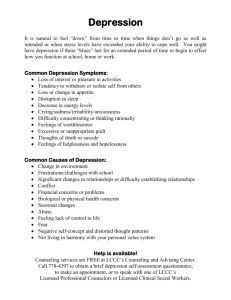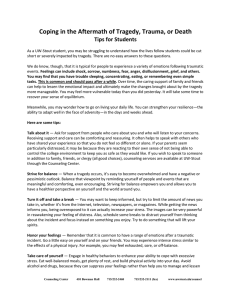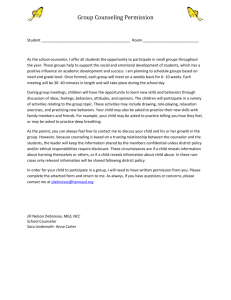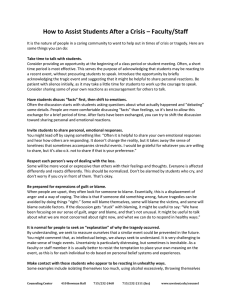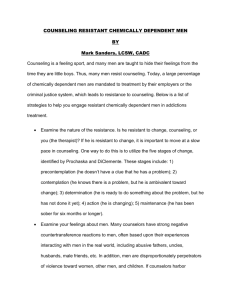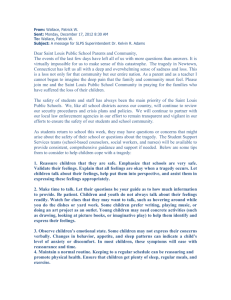Dealing with Tragedy - Laramie County Community College
advertisement
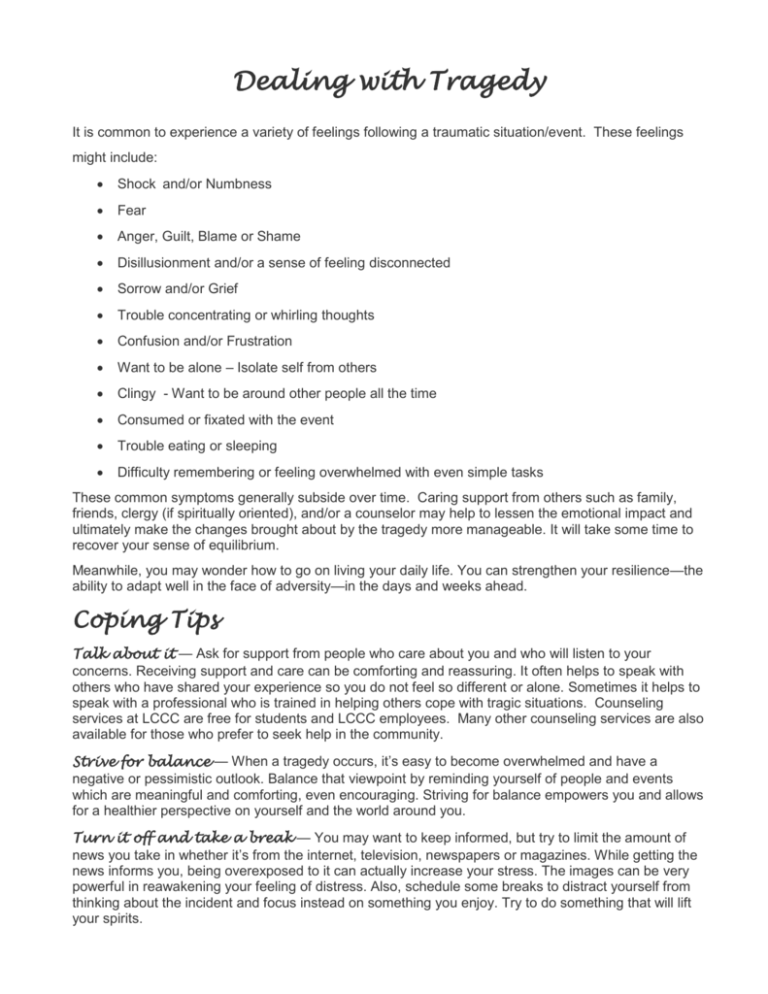
Dealing with Tragedy It is common to experience a variety of feelings following a traumatic situation/event. These feelings might include: Shock and/or Numbness Fear Anger, Guilt, Blame or Shame Disillusionment and/or a sense of feeling disconnected Sorrow and/or Grief Trouble concentrating or whirling thoughts Confusion and/or Frustration Want to be alone – Isolate self from others Clingy - Want to be around other people all the time Consumed or fixated with the event Trouble eating or sleeping Difficulty remembering or feeling overwhelmed with even simple tasks These common symptoms generally subside over time. Caring support from others such as family, friends, clergy (if spiritually oriented), and/or a counselor may help to lessen the emotional impact and ultimately make the changes brought about by the tragedy more manageable. It will take some time to recover your sense of equilibrium. Meanwhile, you may wonder how to go on living your daily life. You can strengthen your resilience—the ability to adapt well in the face of adversity—in the days and weeks ahead. Coping Tips Talk about it — Ask for support from people who care about you and who will listen to your concerns. Receiving support and care can be comforting and reassuring. It often helps to speak with others who have shared your experience so you do not feel so different or alone. Sometimes it helps to speak with a professional who is trained in helping others cope with tragic situations. Counseling services at LCCC are free for students and LCCC employees. Many other counseling services are also available for those who prefer to seek help in the community. Strive for balance — When a tragedy occurs, it’s easy to become overwhelmed and have a negative or pessimistic outlook. Balance that viewpoint by reminding yourself of people and events which are meaningful and comforting, even encouraging. Striving for balance empowers you and allows for a healthier perspective on yourself and the world around you. Turn it off and take a break — You may want to keep informed, but try to limit the amount of news you take in whether it’s from the internet, television, newspapers or magazines. While getting the news informs you, being overexposed to it can actually increase your stress. The images can be very powerful in reawakening your feeling of distress. Also, schedule some breaks to distract yourself from thinking about the incident and focus instead on something you enjoy. Try to do something that will lift your spirits. Honor your feelings — Remember that it is common to have a range of emotions after a traumatic incident. You may experience intense stress similar to the effects of a physical injury. For example, you may feel exhausted, sore, or off balance. Take care of yourself — Engage in healthy behaviors to enhance your ability to cope with excessive stress. Eat well-balanced meals, get plenty of rest, and build physical activity into your day. Avoid alcohol and drugs because they can suppress your feelings rather than help you to manage and lessen your distress. In addition, alcohol and drugs may intensify your emotional or physical pain. Establish or reestablish routines such as eating meals at regular times and following an exercise program. If you are having trouble sleeping, try some relaxation techniques, such as deep breathing, meditation, or yoga. Help others or do something productive — Locate resources in your community on ways that you can help people who have been affected by this incident, or have other needs. Helping someone else often has the benefit of making you feel better, too. If you have recently lost friends or family in this or other tragedies — Remember that grief is a long process. Give yourself time to experience your feelings and to recover. For some, this might involve staying at home; for others it may mean getting back to your daily routine. Dealing with the shock and trauma of such an event will take time. It is typical to expect many ups and downs, including "survivor guilt"—feeling bad that you escaped the tragedy while others did not. When to Consider Professional Help For many people, using the tips and strategies mentioned above may be sufficient to get through the current crisis. At times, however an individual can get stuck or have difficulty managing intense reactions. A licensed mental health professional such as a Licensed Professional Counselor or a Licensed Clinical Social Worker can assist you in developing an appropriate strategy for working through the many feelings and challenges that accompany tragedy and help with moving forward. It is important to get professional help if… You feel like you have tried your usual self-care activities but are not feeling better You are unable to function or perform basic activities of daily living You are drinking or using drugs to cope You are acting out aggressively towards others You are isolating yourself and becoming depressed You have thoughts of harming yourself or another person Recovering from such a tragic event may seem difficult. Persevere and trust in your ability to get through the challenging days ahead. Taking the steps in this guide can help you cope at this very difficult time. For more information or to speak with a counselor, call the Laramie County Community College Counseling and Advising Center at 778-4397. Counseling is free and confidential for all LCCC students, staff, faculty and administration. Walk in appointments available. After hours, the on-call counselor can be reached through security for students living in the residence halls: 630-6447. If it is a psychological or life-threatening emergency, call 911.
